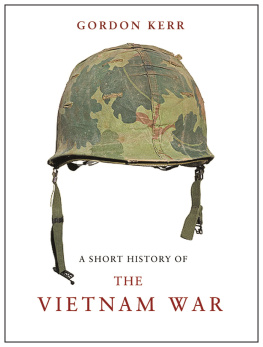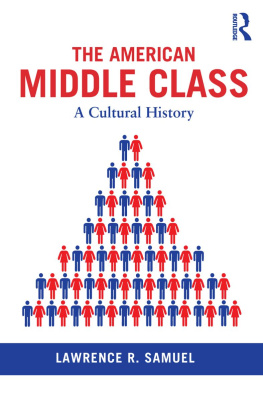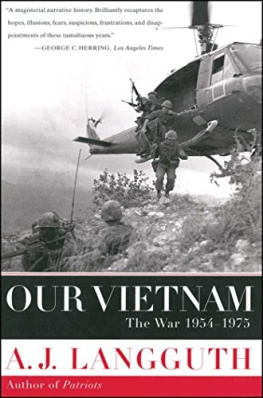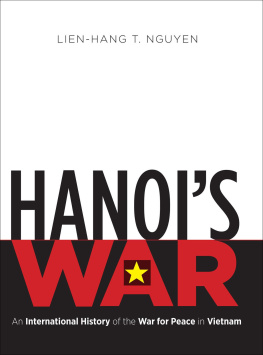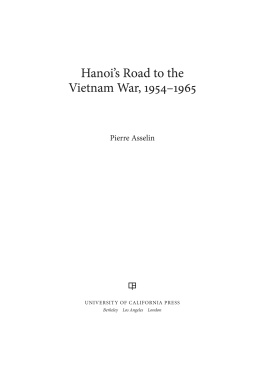THE
VIETNAM
WAR
THE
VIETNAM WAR
A CONCISE INTERNATIONAL HISTORY
MARK ATWOOD LAWRENCE


Oxford University Press, Inc., publishes works that further Oxford Universitys objective of excellence in research, scholarship, and education.
Oxford New York Auckland Cape Town Dar es Salaam Hong Kong Karachi Kuala Lumpur Madrid Melbourne Mexico City Nairobi New Delhi Shanghai Taipei Toronto
With offices in Argentina Austria Brazil Chile Czech Republic France Greece Guatemala Hungary Italy Japan Poland Portugal Singapore South Korea Switzerland Thailand Turkey Ukraine Vietnam
Copyright 2008 by Oxford University Press, Inc.
Published by Oxford University Press, Inc.
198 Madison Avenue, New York, New York 10016
www.oup.com
First issued as an Oxford University Press paperback, 2010
Oxford is a registered trademark of Oxford University Press
All rights reserved. No part of this publication may be reproduced, stored in a retrieval system, or transmitted, in any form or by any means, electronic, mechanical, photocopying, recording, or otherwise, without the prior permission of Oxford University Press.
Library of Congress Cataloging-in-Publication Data Lawrence, Mark Atwood.
The Vietnam War : a concise international
history / Mark Atwood Lawrence.
p. cm.
Includes bibliographical references and index.
ISBN 978-0-19-975393-2
1. Vietnam War, 19611975.
2. Vietnam War, 19611975United States.
3. World politics1945 I. Title.
DS557.7.L378 2008
959.7043dc22 2007050216
1 3 5 7 9 8 6 4 2
Printed in the United States of America
on acid-free paper
ACKNOWLEDGMENTS
It is my great pleasure to acknowledge the assistance I received from numerous institutions and individuals in writing this book. I am grateful above all to the two universities that jointly enabled me to complete the project under ideal conditions. At Yale University, I owe an enormous debt to the Department of History, the International Security Studies program, and Mr. and Mrs. Landon T. Clay. At the University of Texas at Austin, I wish to thank the Department of History, the College of Liberal Arts, and the University Co-operative Society. I am especially indebted to Ted Bromund, John Lewis Gaddis, Paul Kennedy, Ben Kiernan, and John Merriman in New Haven, and to David Oshinsky, Michael Stoff, and Alan Tully in Austin.
I am also grateful to a number of individuals who generously commented on drafts of all or parts of this book. Their suggestions not only tightened my analysis and saved me from errors but also reminded me how fortunate I am to have such supportive and talented friends and colleagues. My sincere thanks go to Thomas Borstelmann, William J. Duiker, Jeffrey Engel, Fredrik Logevall, Edward Miller, Lien-Hang T. Nguyen, Steph Osbakken, Jon Persoff, Andrew Preston, Paul Rubinson, and Bradley Woodworth. Most of all, I am indebted to Christopher Goscha, who meticulously critiqued the entire manuscript and generously shared his extraordinary expertise on the Vietnamese side of the war. Thanks also to Charles Keith and Helen Pho, who helped track down elusive information. At Oxford University Press, Susan Ferber marked up every page with her trademark thoroughness and shepherded the project to completion with a perfect blend of patience and enthusiasm. Christine Dahlin helped immeasurably with the final stages.
I also wish to acknowledge the monumental intellectual debts I owe to those historians who have led the way for many years in writing about the Vietnam War. If this book has merit, it is partly due to that fact that it stands, as Sir Isaac Newton might have put it, on the shoulders of giants such as David L. Anderson, William J. Duiker, David W. P. Elliott, Lloyd C. Gardner, George C. Herring, David G. Marr, Robert J. McMahon, Robert D. Schulzinger, and Marilyn B. Young. I am humbled by their accomplishments and grateful for their inspiring examples. The book also stands on the shoulders of those who have helped me in more personal ways. For their support in this and so many other endeavors, my deepest thanks go to Steph Osbakken; to Jane, Elizabeth, Priscilla, and Patrick MeLampy; and to Robert and Elizabeth Atwood Lawrence.
THE
VIETNAM
WAR
INTRODUCTION
AMERICANS AND OTHER WESTERNERS CALL IT SIMPLY the Vietnam War, but the fighting that took place in Vietnam between 1961 and 1975 has many names. The Vietnamese call it the American War to distinguish it from confrontations with other foreign enemies during their countrys bloody twentieth century. Scholars and others striving for greater detachment prefer the Second Indochina War to mark it off from earlier and later conflicts and to emphasize that the fighting engulfed not just Vietnam but Cambodia and Laos as well. During the war, still other names prevailed. The Vietnamese communists labeled it grandly the War of Liberation or the Anti-U.S. War of National Salvation. American leaders, eager to downplay its significance, often called it merely the Vietnam conflict.
War or conflict? The Vietnam war or just one of many? War of liberation or something less heroic? Merely an episode in Vietnamese history or part of regional, perhaps even global, processes? It depends, of course, on ones point of view. Since journalists, memoirists, historians, and other commentators started writing about the war in the 1960s, the overwhelming majority of books and articles have examined it from the standpoint of the United States. They have, that is, relied on American sources and analyzed the war as an episode in American history. This tendency is hardly surprising. Of the major participants in the war, the United States has gone furthest in allowing researchers access to once-secret documentation. It is therefore simply more feasible to write authoritatively about U.S. behavior than that of other countries. Moreover, by far the most intense controversies have swirled around the American role in the war. It has therefore seemed especially urgent to understand why Americans acted as they did.
Only in recent years have the outlooks and experiences of the other belligerents received detailed attention. In part, this trend grows from a mounting desire among scholars to move beyond old polemical battles and to understand the war in all its complexity. More than anything, though, it reflects the availability of new source material since the collapse of the Soviet bloc in the late 1980s and early 1990s and the opening of Vietnam to the outside world during the same period. Before these developments, documentary records reflecting North Vietnamese, South Vietnamese, Chinese, Soviet, and East European calculations were off-limits to historians, kept secret by authoritarian governments with no desire to open their national security decisions to scrutiny. The end of the Cold War altered the situation by decreasing sensitivities in many countries about recent history. For the first time, scholars gained access, albeit incomplete and sometimes temporary, to archival collections that enabled them to penetrate old walls of secrecy.
The resulting wave of scholarship has revolutionized the study of the Vietnam Warthe term this book will employ because of its familiarity to Western readersin various ways. Most simply, new research has begun exposing the motives and calculations that drove policymakers in Hanoi and Saigon as well as in Beijing, Moscow, and other capitals around the world. At the same time, scholars working with Vietnamese sources have gone further than ever before toward understanding the attitudes of ordinary Vietnamese who fought on both sides of the conflict. On a more conceptual level, sources from around the world have enabled historians to view the war more fully than before as an episode in global historyan expression of phenomena such as decolonization and the rise of international communism. The new scholarship has also brought new subtlety to the study of the American role in the war. Documentation from other countries has revealed the considerable extent to which decisions made elsewhere shaped, constrained, and sometimes determined U.S. choices. Moreover, the new studies have informed the debates that continue to preoccupy Americans. Was the war winnable in any meaningful sense? Was there ever a realistic chance for a negotiated settlement? Was the Vietnamese revolution fundamentally communist or nationalist in character? Deep knowledge of Vietnamese, Chinese, and Soviet behavior is essential to answer these questions persuasively.
Next page


